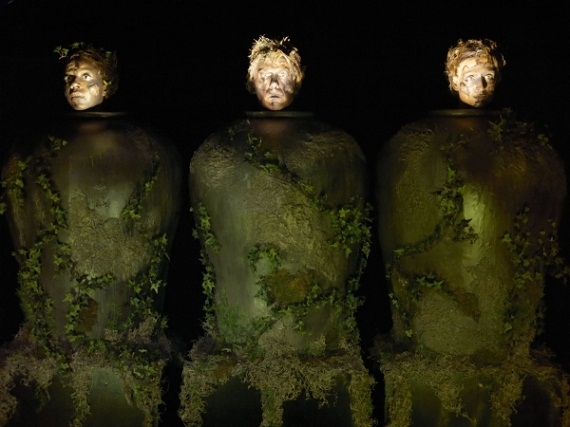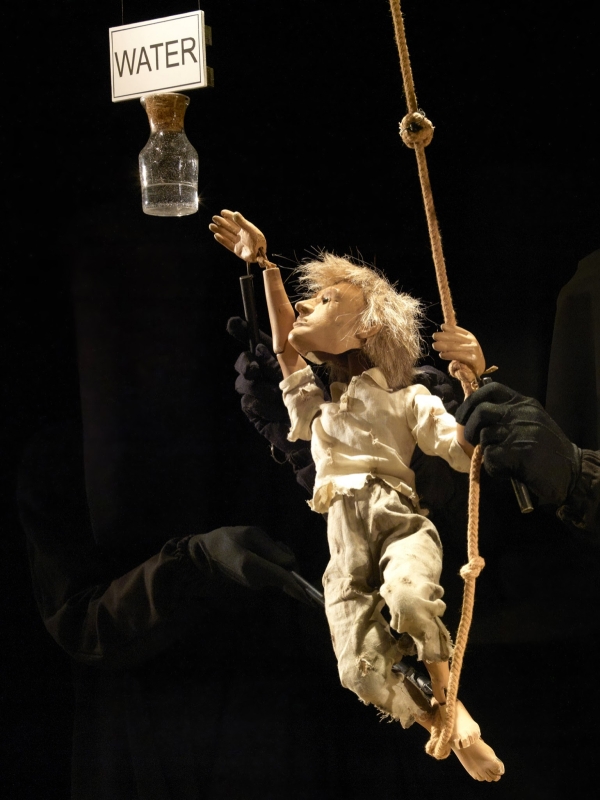A Mind-Bending Evening of Beckett

(© MARCUS-WADE STUDIO)
New York City has Samuel Beckett on the brain. The Nobel Prize-winning playwright's classic Waiting for Godot will soon open on Broadway, while a Yiddish version of Godot just closed at the Castillo Theatre; a three-play show of Beckett solo pieces recently ended its run at the JACK in Brooklyn; and a staging of Beckett's radio play All That Fall is about to open at 59E59 Theaters. But right now it's the Irish Repertory Theatre's turn, where you'll find three Beckett shorts on which to exert your existentialist faculties. The 75-minute production, directed by Bob Flanagan, is the latest must-see for Beckett fans and those who want to go beyond Godot.
Beckett's works can be perplexing and disorienting. His characters tend to exist in barren landscapes and hopeless circumstances, but they manage to plod along with the habit of life however they can. It's bleak material to a point, but Beckett infuses humor into his depictions of human futility. His plays might not all be knee-slappers, but they are rooted in the comic.

(© MARCUS-WADE STUDIO)
A Mind-Bending Evening of Beckett brings together three such plays, each of them short and quintessentially Beckett: Act Without Words, Breath, and Play. The first two make up the first act of the evening, and not a word is spoken in either of them. In Act Without Words, in which the only character is a thirsty man stranded in a desert landscape, the role of the man is played by a Bunraku puppet operated by three puppeteers. The thirsty man is tantalized by a carafe of water that dangles above him, always just out of reach. His absurdly funny (and pathetic) efforts to get hold of the carafe are repeatedly thwarted, and ultimately he resigns himself to going without it.
The second play, Breath, is the shortest in the Beckett oeuvre, less than one minute in length. The scene is a garbage-strewn wasteland. We hear the cry of a baby being born, followed by the inhalation and exhalation of a single breath. Is this brief play Beckett's ultimate assessment of the human condition? Maybe. In any case, at the end you'll probably find yourself chuckling.
While the first two plays involve only gestures and sounds, the evening's second act, Play, is all about words, lots and lots of words spoken rapidly by the members of a bitter love triangle. Three large, ivied funeral urns hold a man (Paul Radki) and two women, one of whom is the man's wife (Rachel Pickup), the other the man's mistress (Sameerah Luqmaan-Harris). A spotlight that feels more like an interrogation beam quickly moves from one face to the next as the three recount their versions of the man's extramarital affair. They seem stranded in a purgatory of sorts, destined to torture one another with the retelling of the adultery. Radki, Pickup, and Luqmaan-Harris deliver their lines with frightening precision, as though they are strafing one another (and the audience) with their words. The effect is breathtaking for the audience, and literally so for the actors. A Mind-Bending Evening of Beckett is worth attending for these performances alone.
Together, these three plays make up a thought-provoking, weird, entertaining evening of theater. Irish Rep's use of puppetry in Act Without Words adds marvelous depth to the play; the stranded puppet-man, literally moved by external forces, raises questions about free will in human affairs. The set of Breath (designed by N. Joseph Detullio) is impressively detailed for such a short play. And the marvelously performed Play, the standout work of the evening, might haunt the thoughts of anyone who has ever been torn between two lovers — or trapped in an urn. So while you're getting ready to quench your thirst for Beckett with Waiting for Godot, take a few small preliminary sips at Irish Rep.










